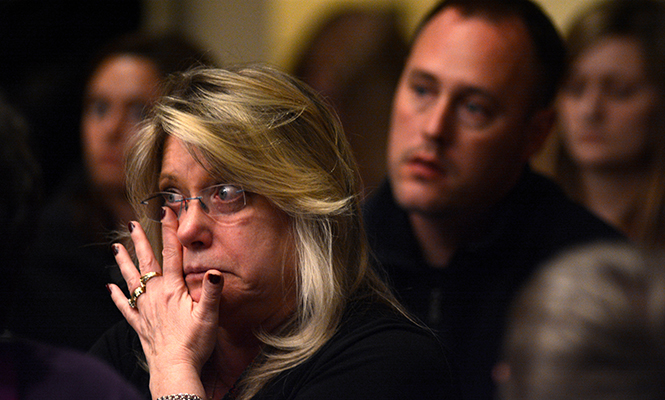Candlelight vigil planned in memory of Chardon shooting
Donna Piszko, a Chardon resident of 15 years, wipes a tear away while listening to Principal DeAngelis speak about unity in communities that have experienced school shootings. “You always have a home with Columbine High School”, he said about Chardon High School.
February 20, 2014
Two years ago, the day after Chardon High School’s horrific shooting, Principal Andy Fetchik called one of the only people he could.
Frank DeAngelis, who was the principal for 15 years at Columbine High School in Littleton, Colo., picked up the phone. DeAngelis was the principal at the time of one of the most shocking and remembered school shooting massacres in history that claimed the lives of 12 students and one teacher.
Chardon had joined a “club that no one wants to be a member [of],” as DeAngelis described it. On Wednesday, DeAngelis came to speak, at Fetchik’s request, to the Chardon community for the anniversary of the Feb. 27, 2012 shooting that killed three students and paralyzed one more.
“There’s that perception out there that one day you’re going to wake up, and it’s going to be what it was prior to February 27th … it’ll never get back to normal, we just have to redefine what normal is,” DeAngelis said.
Drawing comparisons between the beauty of the two towns, in both geography and in its people, DeAngelis offered wisdom about healing from a wound that never really scabs over.
“People ask me, they say, ‘Frank, what are you going to do as a school,’ and I ask: ‘What are we going to do as a society?’ ”
He encouraged community members not to think of themselves in the wake of a school shooting as a school but as individuals — parents and grandparents.
The room of about 50 local residents, police officers and children sat in silence choking back tears. DeAngelis explained how post-traumatic stress plays into recovery and encouraged people to seek help.
The unique thing about school shootings compared with any other horrific event, DeAngelis said, was the locality of the trauma. With other events, such as 9/11, survivors can visit but aren’t forced to go back.
“I knew something was wrong when I was walking around areas where the bodies were outlined, where people had died,” he said, referring to the school days after the shooting.
The unique difficulty for school shootings is the locality of the massacres. DeAngelis compared them with other tragedies, which give survivors the ability to heal at their own pace. With a school shooting, teachers and students often have to walk down hallways where they’ve “seen things no human should have to witness,” he said.
The second anniversary of the Chardon shooting falls on Thursday, and a candlelight vigil is being planned.
Contact Jacob Byk at [email protected].












